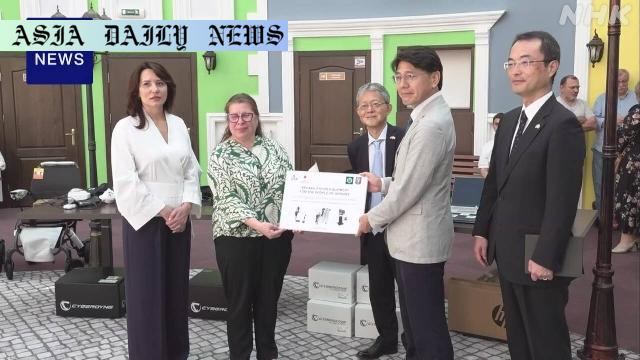Rehabilitation: Japan provides crucial rehabilitation equipment to support children with disabilities in Ukraine, fostering hope and mobility.
- Japan has delivered over 130 rehabilitation devices to Kyiv.
- Equipment includes electric wheelchairs and robot suits.
- The initiative aims to support Ukrainian children with disabilities.
- Rising disability numbers in Kyiv pose equipment shortages.
- Deputy Mayor highlighted support’s role in education and recovery.

Introduction: Japan’s Assistance for Ukraine’s Children with Disabilities
Japan has extended a helping hand to Ukraine by providing rehabilitation equipment tailored for children with disabilities amidst the ongoing challenges caused by the war. Through the Japan International Cooperation Agency (JICA), more than 130 cutting-edge items have been delivered to Kyiv. This contribution includes electric wheelchairs, advanced robot suits designed to aid limb movement, and other innovative technologies, all aimed at improving the quality of life for these children.
The Critical Need for Rehabilitation Equipment in Ukraine
The war in Ukraine has caused a significant movement of people into cities like Kyiv, leading to an increase in the population of children with disabilities. With limited resources and the scarcity of rehabilitation facilities and equipment, the situation has put immense pressure on the healthcare and support systems. Japan’s contribution offers a ray of hope, addressing a pressing need that has amplified due to the ongoing crisis.
Innovative Technologies Changing Lives
The equipment provided not only meets the functional needs of children but also introduces advanced technologies into their rehabilitation process. For instance, a Japanese-developed system incorporates gaming elements into therapy. This interactive technology works by using sensors to track a user’s movements and translate them into actions performed by a character on a screen, making therapy more engaging while promoting physical activity.
The Emotional and Social Impact
The initiative has also had a profound psychological impact on both the children and their caretakers. The handover ceremony held in Kyiv was an emotional occasion, with children trying out the new devices for the first time. The support not only aids physical rehabilitation but also uplifts the spirits of families who have faced immense hardships. The partnership between Japan and Ukraine showcases how international cooperation can foster resilience and hope in the face of adversity.
Statements from Leaders: Gratitude and Aspirations
Deputy Mayor Maryna Khonda of Kyiv expressed her profound gratitude for the timely support. She emphasized the importance of having access to these advanced devices for helping children regain mobility and participate actively in education. Likewise, Japan’s Ambassador to Ukraine, Nakagome Masashi, highlighted Japan’s commitment to using its technological advancements for humanitarian assistance, expressing hope that this support will make a substantial difference in the lives of Ukrainian families.
Long-Term Goals and Challenges
While this initiative marks a significant stride towards improving rehabilitation services, it underscores the larger issue of long-term support for children with disabilities in conflict zones. The introduction of such advanced technologies also calls for comprehensive training programs for caregivers and therapists to maximize their potential benefits. This partnership can serve as a blueprint for similar humanitarian efforts globally, ensuring that technological innovation is channeled towards uplifting vulnerable communities.
Conclusion: A Testament to Resilience
Japan’s initiative exemplifies the power of compassion and innovation. By addressing the urgent needs of children with disabilities in Ukraine, it shines a light on the importance of international collaboration. As these children embark on their journey towards recovery with the support of these advanced tools, the project serves as a reminder that even in the backdrop of adversity, hope and progress are always possible.



Commentary
Japan’s Thoughtful Gesture: A Lifeline for Children in Ukraine
The recent move by Japan to provide rehabilitation equipment to Ukraine comes as a heartwarming reminder of the role international solidarity plays in addressing global crises. This initiative is not just about delivering equipment—it is an act of empathy, aiming to offer a sense of normalcy and hope to children whose lives have been altered by the conflict.
Technology as a Tool of Empowerment
One of the highlights of this support is the introduction of cutting-edge devices, such as robot suits and gaming-assisted therapy systems. These innovations go beyond physical healing; they promote engagement, independence, and a sense of accomplishment for children. Seeing Japan’s technological prowess being used in this way reinforces the idea that science and technology can be powerful tools for humanitarian aid.
Challenges and Inspirations
While this initiative is commendable, it also brings attention to the large gaps that remain in supporting war-affected populations, especially children with disabilities. The collaboration between Japan and Ukraine can inspire other nations to step up their efforts, pooling resources and expertise to address crises more effectively. Every step forward, no matter how small, can make an enormous difference in the lives of those suffering the most.
A Lesson in Kindness
Japan’s efforts serve as a poignant lesson in global citizenship. By addressing a crucial need in Ukraine, the nation has demonstrated that compassion knows no borders. In times of hardship, such gestures remind us of our shared humanity and the collective responsibility we bear towards one another. As these children gain a chance at a better future, we are reminded of the deep impact of international cooperation for the greater good.